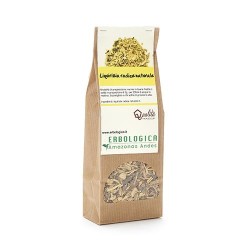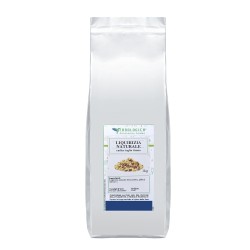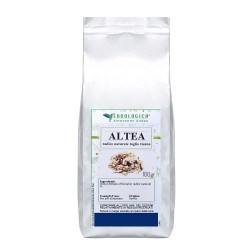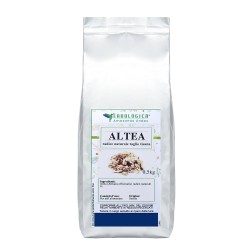
La ritenzione idrica è una condizione in cui l'acqua in eccesso viene immagazzinata in diversi tessuti del corpo.
Si manifesta con il gonfiore delle caviglie, delle mani e talvolta del viso.
Può essere fastidiosa e a volte persino dolorosa.
Ridurre la ritenzione idrica in modo naturale è altamente consigliato per mantenere i normali livelli di idratazione e prevenire ulteriori complicazioni a lungo termine.
Esistono diversi modi per ridurre la ritenzione idrica, tra cui bere molta acqua ogni giorno, ridurre l'assunzione di sale, evitare l'alcol, mangiare meno carboidrati e aggiungere alla dieta alcuni integratori a base di erbe.
Tuttavia, non tutte le erbe sono uguali quando si tratta di combattere la ritenzione idrica perché hanno proprietà diverse.
Alcune erbe possono funzionare meglio di altre a seconda di ciò di cui il vostro corpo ha bisogno in quel momento.
Kelp
Fieno greco
Tarassaco
Camomilla
Radice di liquirizia
Radice di Altea
Conclusione
Contiene numerose vitamine, minerali e aminoacidi, oltre a molti componenti attivi noti come fitonutrienti.
Il kelp è un potente diuretico, il che significa che aumenta la minzione e riduce la ritenzione idrica nel corpo.
Possiede inoltre proprietà ipoglicemizzanti, antinfiammatorie e antiossidanti.
Il principale composto attivo dell'alga è l'acido alginico, ritenuto responsabile della maggior parte dei suoi benefici per la salute.
Il modo migliore per assumere l'alga è sotto forma di tè, poiché è il modo più semplice per estrarre i suoi principi attivi.
Si può anche aggiungere l'alga ai frullati o alle insalate.
Se decidete di acquistare degli integratori di kelp, assicuratevi di acquistare una marca di alta qualità, poiché molti di essi contengono troppo sale e/o altri riempitivi.
Il fieno greco è un'erba usata da migliaia di anni per trattare vari disturbi.
Si ritiene che abbia proprietà antinfiammatorie e antidiabetiche e che possa essere usato come trattamento naturale per la ritenzione idrica.
I semi e i germogli di fieno greco contengono diverse vitamine e minerali, oltre a sostanze antiossidanti, ottime per mantenere l'organismo idratato.
Il modo migliore per usare il fieno greco per ridurre la ritenzione idrica è in un frullato con altre erbe diuretiche.
Potete anche far bollire i semi con altri ingredienti a base di erbe antinfiammatorie come la curcuma, lo zenzero e la cannella.
Assicuratevi di bere il tè quando è caldo.
Il tarassaco (Tussilago farfara) è un'erba tradizionale usata da secoli per trattare la ritenzione idrica.
È un diuretico che può ridurre il gonfiore ed è anche un leggero analgesico che può aiutare ad affrontare il dolore causato dalla ritenzione idrica.
Il modo migliore per utilizzare il tarassaco è sotto forma di tè.
Si possono anche usare capsule o compresse essiccate, ma con un sapore meno intenso.
La camomilla (Chamomilla recutita) è un'erba comunemente usata per trattare lievi forme di ansia.
È anche considerata un diuretico che può ridurre la ritenzione idrica nel corpo.
La camomilla viene solitamente assunta sotto forma di tè, ma è possibile trovarla anche sotto forma di capsule o tinture.
La radice di liquirizia è un'erba usata da migliaia di anni per trattare vari disturbi. Può ridurre la ritenzione idrica nel corpo aumentando la minzione e riducendo i livelli di sodio. La liquirizia viene comunemente assunta sotto forma di tè, ma si può trovare anche in capsule o tinture. Se si sceglie di assumere la radice di liquirizia sotto forma di compresse o capsule, assicurarsi di acquistare una marca di alta qualità. Alcuni prodotti a base di liquirizia sono troppo ricchi di sodio, il che non è positivo per la ritenzione idrica.
La radice di altea è un'erba diuretica usata da centinaia di anni per trattare la ritenzione idrica. Viene comunemente assunta sotto forma di tè, ma è possibile trovarla anche in capsule o tinture.
È possibile ridurre la ritenzione idrica seguendo una dieta e uno stile di vita sani.
Evitare sale, alcol e caffeina è il primo passo.
Potete anche aggiungere alla vostra dieta alcuni integratori a base di erbe, come l'alga, il fieno greco, il tarassaco, la camomilla e la radice di liquirizia, che sono diuretici naturali.
Seguendo questi consigli, sarete certi di ridurre la ritenzione idrica e di rimanere idratati, sani e felici!





